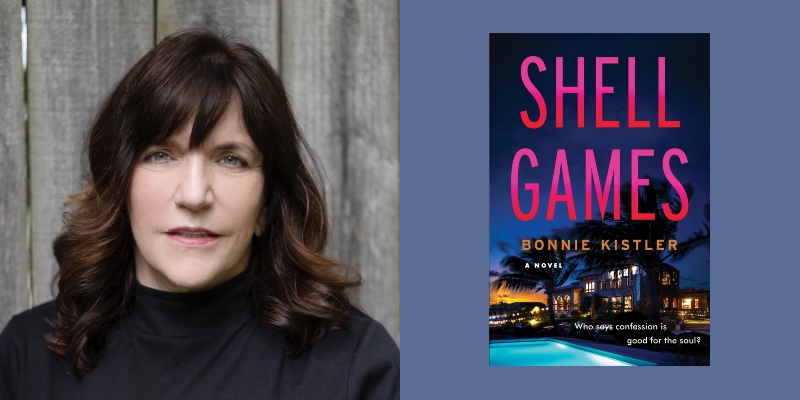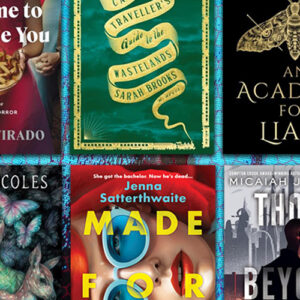In her recent essay right here in CrimeReads, the author Bonnie Kistler discusses how the classic noir film Gaslight influences her new thriller, Shell Games. Her laser focus on the myriad dynamics at play among her large, often-devious cast makes for an entertaining tale of deception and duplicity.
At the start of the story, Kate Sawyer, at 70 a self-made, ultra-successful (and ultra-wealthy) real estate developer in Sarasota, Florida, is marrying her high school sweetheart, Charlie Mull. The young lovers had been separated by Charlie’s service in Vietnam and Kate’s admittance to Radcliffe. They remained apart, out of touch, for over 50 years until a fluke encounter at a luxe car dealership where Charlie was working and Kate’s son-in-law, Eric, purchased a high-end car. The two men bonded, and Eric invited Charlie to dinner so he could meet Julie, his new wife. Sweeping in late to join the three was Kate—and that teenage romance rekindled quickly.
Kate and Charlie had a prenup written, but Kate is unconcerned about its ever being necessary. “He loved her, but he didn’t need her. It was such a refreshing change from most of the men who made up most of the dating pool for women her age. Florida women had an expression born of bitter experience: The men were only after a nurse or a purse.”
It’s all good. Off to their wedding night before leaving for a Tahitian cruise, as they prepare for bed after an exhausting day, Kate tipsily asks Charlie to open a stubborn bottle of Tylenol for her. Charlie says, “I want us to always be completely honest with each other.” “Of course,” replies Kate. “Do you remember the Tylenol murders?” “What?” says Kate. She “blinked hard. She couldn’t imagine why he was bringing this up now.”
Charlie continues, “In Chicago, back in the 80s, when somebody tampered with the bottles on the store shelves and put potassium cyanide capsules in with the pills? Seven people died?”
Now she understands. “God, yes,” she says. “That’s why we all have to suffer now with these damn tamperproof caps.” Charlie easily opens the bottle, as Kate thinks that she finally has it all. Then, “‘Katie. Darling,’ he said sadly as the room tilted leftward. ‘I have a confession to make.’”
Just like that, Kate’s world implodes. The collateral damage envelops dweeby Julie, a small star in the constellation that her mother shines so brightly in. Eric, Julie’s arrogant surgeon husband; her sister-in-law, a young judge, Greta; and Greta’s neurologist husband, Alex, all suddenly seem bent on institutionalizing Kate.
In a recent e-mail interview, I started by asking Kistler about her approach to plotting her stories, which take numerous hairpin curves. She gave an unexpected answer, using a metaphor to explain: “Mystery writers often identify themselves as either plotters––who outline in some detail before beginning to write – or pantsers – who fly by the seat of their pants and simply start writing and see where it takes them.
“I’m definitely not a plotter. I don’t outline, and I believe I’d get bored with the material if I knew every scene that was coming. I like to surprise myself almost as much as I like surprising my readers. But neither am I a pantser, which sounds way more haphazard than the way I approach my work.
“George R.R. Martin coined different terms for this dichotomy: architects and gardeners. Architects plan out every detail before the first nail is hammered, while gardeners plant seeds and wait to see what grows.
“I put myself in the gardening camp. I always begin with a starting premise, and I always know how I want to end up, sometimes down to the closing scene. But I don’t always know exactly how I’m going to get there. It’s like I have a vision of how I want my mature garden to look. I prepare the soil and plant a few foundation shrubs to anchor it. Then I start to plug in some seedlings. Sometimes I have to relocate them. Sometimes I have to rip them out. But as the garden grows, I do my best to cultivate it until it starts to resemble the vision I started with.”
Kistler is a former attorney. Shell Games and her previous two novels, Her, Too and The Cage, center around women who are “working in what is traditionally considered a man’s world. This of course comes out of my own background as a lawyer representing business clients. I think it distinguishes my work from that of many of my contemporaries in the psychological suspense world where the focus is more often on domestic issues.”
And Kistler acknowledges that she sharpened her writing skills on the job: “My prior career as a lawyer informs my writing in other ways, too. As a litigator preparing cases for trial, it was my job to take the facts, polish and massage them as best I could, and put them together in a package designed to engage and persuade. This is exactly what I do as a novelist, too, with the huge advantage that now I get to make up the facts!
“Also, a lot of work in litigation is done in the form of writing – briefs, motions, affidavits – and that’s where I honed my use of language. People think legal writing is dry and stuffy, and I suppose it can be in some hands. But not in mine. I developed a reputation for using more evocative, sometimes colorful, language than most, and I think it made me a more effective advocate.”
Kate’s daughter, Julie, initially is a submissive underling to her mother’s go-go business identity. She’s a lawyer who works for and stays close to her mother, even though she can feel less than important in Kate’s life. As the story evolves, Julie rises to numerous challenges, not the least of which is her oppressive husband, Eric, who seems primarily interested in her for two things: money and aggressive sex.
“A few years ago at a bookstore event, a reader announced that she’d read all my books and what she loved best was how they center on smart, strong women. That was exactly my aim, but as her words sank in, I thought, I’m in a rut. So, I challenged myself in Shell Games to create a different kind of female protagonist. Julie suffered a childhood trauma, she’s grown up in the shadow of a powerful mother, and she married a domineering man. The result is that she’s timid and unsure of herself, and it takes the events of the novel for her to emerge as smarter and stronger than anyone realized, including herself.”
Kistler lives part-time in Florida, and the state is indeed a character in the story. She lives the rest of the time in the Asheville, North Carolina, area. I commented that the hurricane in the book seemed almost uncanny considering recent events and that the portrayal of contemporary Florida is captured expertly.
“In Shell Games, the setting is so critical to the story,” she says. “I’ve been a part-time resident there for more than 20 years, but it took me until now to feel that I truly have a finger on the pulse of what’s happening in the state—the book banning, the anti-immigrant fervor, the climate change denial in the face of clear evidence to the contrary, and all of this happening in a diverse population living in paradise. The contradiction writes itself. (Well, not quite. I helped).
“My husband and I aimed for the best of both worlds when we decided to divide our time between Sarasota and Asheville. In Asheville, we enjoy country living, hiking in the mountains, cool summers, and spectacular autumns. In Sarasota, we have in-town walkability, cultural activities, and of course sun and surf.
“But we were not prepared for the double whammy of Hurricane Helene to hit us in both places,” she continues. “The best of both worlds suddenly became the worst. Although we suffered only minor damage to our NC house and none at all to our Sarasota condo, our mountain community is devastated, and so are many homes and businesses on our barrier islands. I wrote a hurricane into Shell Games for dramatic effect and to underscore the climate change issue, but I had no idea how prescient I was being.”
It’s difficult—OK, impossible—to sum up all the machinations of a large cast, but deception, startling revelations, and the surprising demise of one character all combine to a page-turning, OMG! set of cliffhanger chapter endings.
Kistler’s novels would seem to lend themselves to your favorite streamer. “Yes, The Cage has been optioned and in fact is already in development,” she says. “If all goes well, it will be broadcast as a limited TV series on one of the streaming platforms.”
And with her background as a business-oriented attorney, she surely was involved in the legal paperwork for the project?
“There’s no way I could have written this contract—it took a team of Hollywood lawyers to do it!”
Wondering what Kistler is writing now? She ain’t talking.
“I don’t like to talk about my work in progress because I can’t be sure it will turn out the way I hope. Suffice it to say that it’s nowhere near done.”
Undoubtedly, she’s coming up with another compulsively readable twist-a-thon!

















